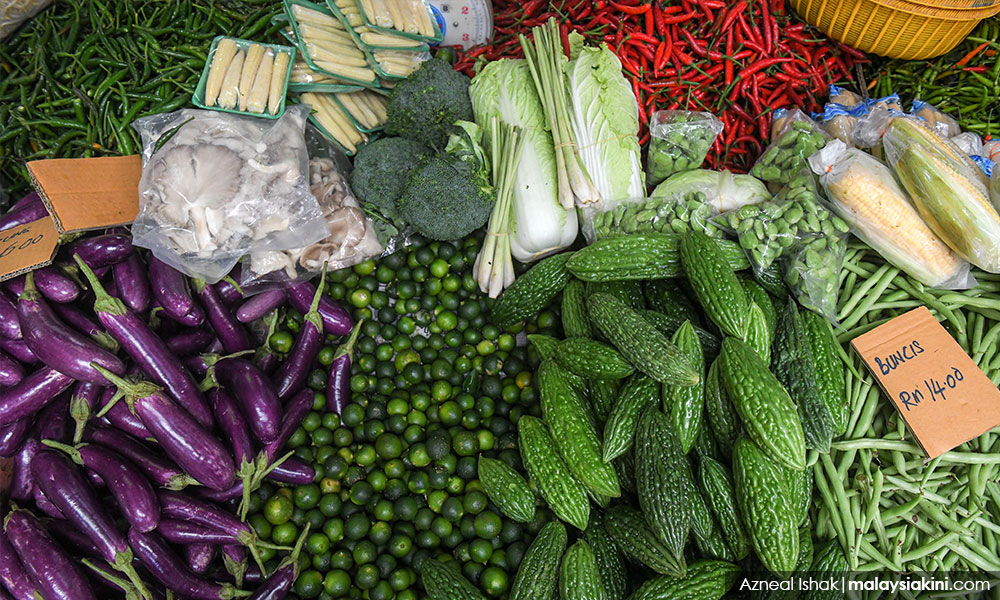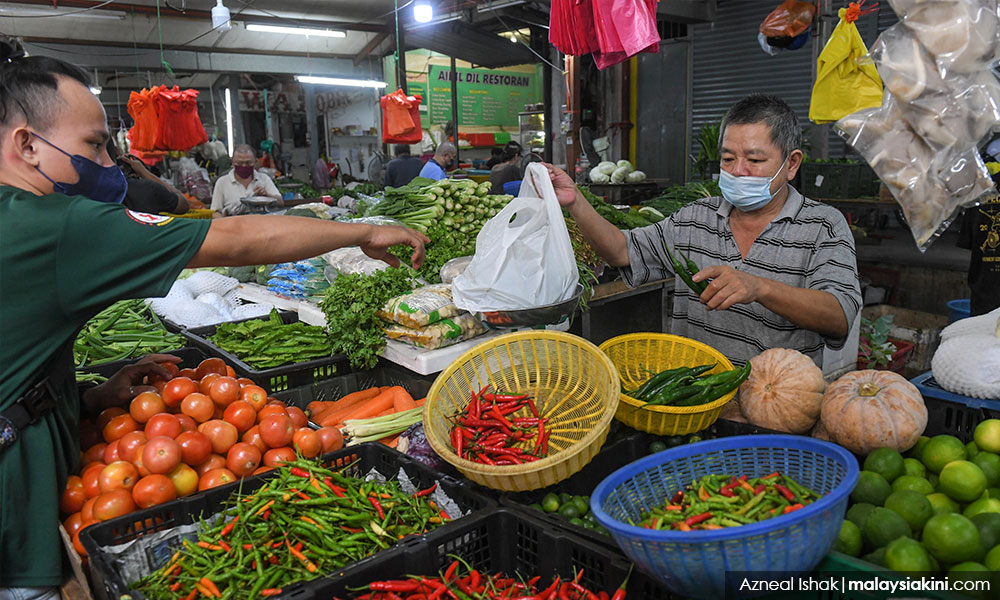'Veggie now pricier than meat', farmers plead for govt assistance
Vegetable farmers and traders have urged the government to address labour shortages and other issues behind the recent price hikes of vegetables, particularly leafy greens.
Cameron Highlands Vegetable Growers’ Association secretary Chay Ee Mong said the labour shortage faced by 2,000 vegetable farmers in the Cameron Highlands has worsened as they failed to retain their labour force even after increasing the monthly salary by 30 percent to RM1,800.
He said this is because the plantation and construction sectors are facing a similar labour crunch since the government implemented a migrant worker freeze in 2018.
This is compounded by the reopening of the economy after Covid-19 lockdowns, in which competing employers in other sectors are offering migrants higher wages.
"The migrant workers were offered up to RM3,000 monthly wages and the farmers were in no position to follow suit. The plantation sector was able to do so because the crude palm oil futures price rose to RM5,000 a tonne," he told Malaysiakini when contacted.
"As for us, we applied for the labour and paid all the necessary fees and we lost them due to higher pay," lamented Chai.
"We need up to four labourers for every acre of farming land. Without manpower, we were forced to reduce our production," he said, adding these issues should be resolved as it is not fair to law-abiding farmers who were unable to compete with larger players in the construction and plantation sectors with stronger financial abilities.
"The workers come into Malaysia as legal workers and when they leave they become illegal migrant workers. And now there is a plan to legalise them," he said.
Last month, the home minister said that the employers with undocumented migrant workers under their employment have until year-end to participate in the ministry’s recalibration programme, which is implemented to ensure all migrant workers in the country are legal and documented.
A total of 212,926 undocumented migrants had registered to be regularised as legal workers under the recalibration programme.
Bad weather and expensive fertilisers
The Consumers’ Association of Penang (CAP) raised concerns recently after it found that prices of some vegetables had increased by up to 200 percent in the past two weeks.
CAP revealed that prices of sawi pendek (choy sum) have increased from RM3 per kg to RM9 per kg, a hike of 200 percent, broccoli from RM8 per kg to RM20 per kg, an increase of 150 percent and cauliflower from RM7 per kg to RM16 per kg, a hike of 100 percent.
It urged the government to take immediate steps to stem the price hike that started in early November.
Chai said another factor behind the price hikes was bad weather, with farmers “living at the mercy of nature” as they had to deal with excessive rainfall, cloudy weather, low temperatures and landslides in the Cameron Highlands.
"The bad weather further reduced our production capacity but also affected the quality of the vegetables. Uncertain climate is now a world phenomenon that has hit the vegetable-exporting countries in the region," he said.
"We are equally impacted by the rising costs in plastic materials as we largely depend on plastic rain cloth to protect vegetables from heavy rain and we need to replace them every three to four years. The price increased to over RM200,000 per acre of farmland as compared with RM130,000 previously," he said.
Chai said the prices for imported fertilisers and pesticides have also increased, further worsening the issue.
This is due to China’s electricity rationing measures, which affected the manufacturing industry in the country.
"Take the urea fertiliser we imported from China as an example, the global urea price is now at RM4,000 from RM1,000, and yet we continue to face fertiliser shortages worldwide. We were informed that the price of fertiliser will continue to increase next year," he said.
High prices expected until CNY
Meanwhile, Kuala Lumpur Vegetable Wholesalers’ Association president Wong Keng Fatt blamed bad weather since November for vegetable price hikes and expects the prices would remain high until the Chinese New Year festive season in early 2022.
"While it was the norm that the year-end monsoon season would affect vegetable production in the past, the recent weather is worse as we have cloudy weather and excessive rain every day," he said.
"Vegetable production was reduced by 30 to 50 percent as proper photosynthesis failed, resulting in a price hike, particularly leafy greens," he said.
"During the rainy season, we need to throw away more spoiled vegetables as compared to the dry season. This will be taken as cost for the traders," he said.
"However, not all vegetable varieties saw an increase in price. The wholesale price for the beans, gourds and tomatoes were either reduced or remained the same according to our price list on Nov 24," he said.
He, however, noted that imported vegetables were more expensive now due to a reduction of vegetable production in the exporting countries, including China, Thailand and Vietnam.
"These countries were either affected by cold weather or floods," he said.
'Meat cheaper than vegetables'
Meanwhile, a vegetable hawker who wished to be known as Tan said that the higher upstream production costs forced hawkers to sell over half of their vegetables at the markets in the Klang Valley.
"Why do I say so? The vegetable hawkers mainly get their vegetable source from the wholesale market, unlike the supermarkets and hypermarkets getting directly from the farms," said Tan, who operates a vegetable stall in the Old Klang Road market.
"Taking choy sum as an example, the price shot up to RM8 per kg now compared to the price in October. The price of imported cauliflower has increased from RM13 to RM20 as compared to RM6 per kg previously," she said.
"In fact, vegetable prices remained high during the Covid-19 pandemic due to various reasons, and this time it is due to the bad weather," she said.
"Some of the consumers understood the situation we are in and joked that 'it's pricier to buy vegetables as compared to meat and fish nowadays'," lamented Tan.
Domestic Trade and Consumer Affairs Minister Alexander Nanta Linggi recently said several action plans were being drawn up by the government to assist the industry which was hit by heavy production costs.
Prime Minister Ismail Sabri Yaakob announced that the government will allocate RM262 million to assist farmers affected by the increase in the prices of fertilisers and pesticides.
This includes RM200 million agro-food loans at zero interest, in addition to a six-month loan repayment moratorium, and RM62 million subsidy allocation and paddy incentive. - Mkini
✍ Credit given to the original owner of this post : ☕ Malaysians Must Know the TRUTH
🌐 Hit This Link To Find Out More On Their Articles...🏄🏻♀️ Enjoy Surfing!






















Post a Comment